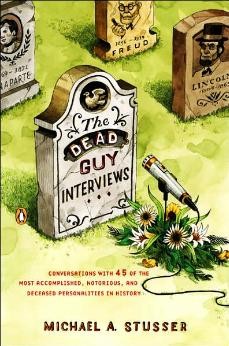In “”The Dead Guy Interviews: Conversations with 45 of the Most Accomplished, Notorious, and Deceased Personalities in History”” writer Michael A. Stusser has taken it upon himself to interview some of the most infamous political leaders, fantastic artists and brilliant minds since the beginning of time (in spite of the fact they’re all dead).
Each person “”interviewed”” is given a brief bio (think like the spark notes of their life) and then the interview begins. Even though most of the people have been dead for a while, Stussel brings them back to the present for their interview. Since that’s the case, the interviewees are more than willing to rehash on their lives plainly instead of saving face, though a few are a little antsy about it. Emily Dickinson, for instance, is asked plainly if she is a lesbian, but like the others interviewed about unsavory topics, Dickinson’s reply is clever as she points to love poems written for a man and for a woman, the kind of thing that causes the current ambiguity.
Salvador Dali is a fun interview. About halfway through he begins climbing on a chandelier and Stusser asks him, “”Please get down from there,”” and Dali replies, “”Please get up from there.”” It’s characteristic weirdness from Dali combined with subtle hilarity. Stusser manages to keep up with each character, and it’s this ability to recreate entire personas of the people of history within a few short pages that makes the book interesting. The interviewees are able to throw a few true quotes in there as well, hitting on the pivotal points of their lives and important aspects of their thought.
Perhaps one of the least effective parts of the book is the accents: Benito Mussolini and Leonardo Da Vinci have a’s thrown after every other word; Albert Einstein has a thick German accent; and Crazy Horse talks in stereotypical Native American stunted English. Funny at first, but a little annoying after a while.
In addition to the book, a few of Stusser’s interviews are posted on YouTube. Check it out if you’re interested in what Sigmund Freud or Ghengis Khan had to tell him.









